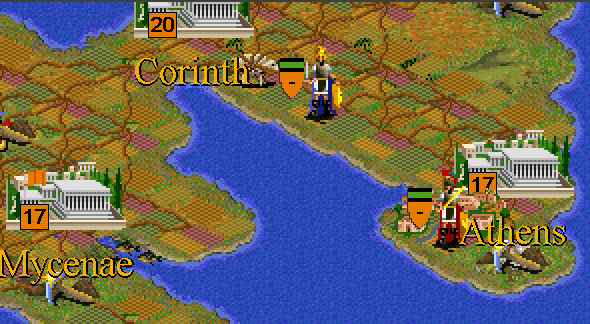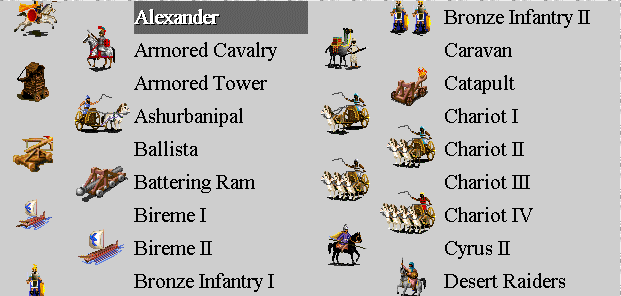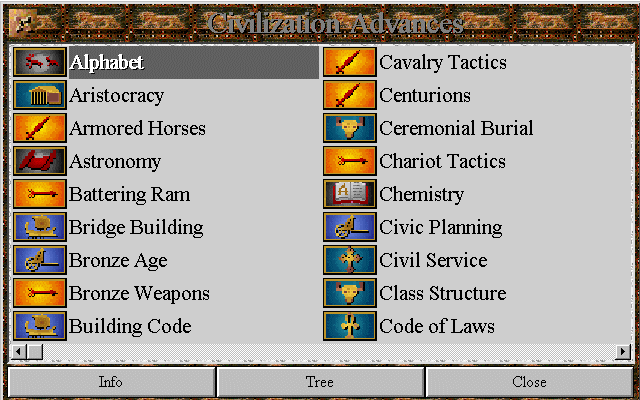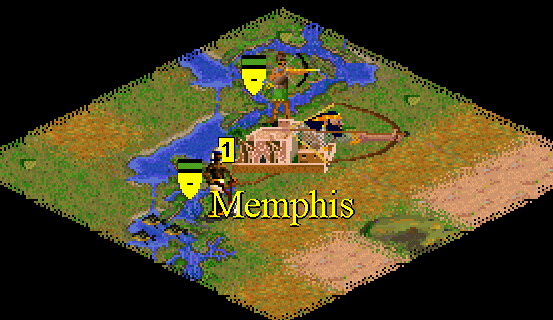General Information:
- Name of Scenario : Seeds of Greatness – The Early Empires
- Final Score : 26.5/30
(Breakdown: 0-10 terrible /11-15 Average/ 16-20 Good/ 21-25 Excellent/ 26+Best possible) - Type of Scenario: Historical
- Name of Author: Paul "Kull" Cullivan
- Name of Reviewer: Alcibiaties of Athenae
Summary of Scenario:
| This scenario represents the birth of civilization in the near east, starting from 3500 BC and continuing until 0AD. The player may choose from any of Seven historically accurate civilizations at the dawn of history, the Hittites, Assyria, Babylonia, Egypt, Persia, Mycenean Greece, and the Minoans are all available for play, each with custom events and a special leader unit specific to that civilization. The map includes Greece, all of Asia minor, the near east, parts of Persia, Mesopotamia, the Levant, all of Egypt and parts of Libya, so there is plenty of room for both trade and expansion. As in basic Civ-2, you start knowing little, with just a size one city that grows slowly, and an exploring unit. There are huts to trigger, and the events provide slaves (free settler units) if your forces defeat minor tribes sprinkled around the map, so you rarely need to build your own settlers to expand, like the ancients, you can attack to grow! You can also gain envoys (diplomats) this way also, to buy off other cities and steal technology. Your mission is to take the capital of EVERY other starting civ and hold it at game’s end for victory, what the author calls the "Alexander solution". Each nation starts in it’s historical start area, and the game includes a completely new tech tree, units and wonders that fit this time period. |

Playability – Section Sub-total: 6
Were you able to finish in a reasonable amount of turns? (Score: 1 )
There are 350 turns in this game total, which may seem like alot,
but since you start with virtually nothing, it isn’t really that much
time.
Did the scenario avoid being tedious or repetitive? (Score: 1 )
Not at all, the race for civic improvements, better technology, and
to open the map of the ancient world all make this game quite
interesting.
Did the scenario capture the essence of what it was portraying? (Score: 1 )
Absolutely, far better then any ancient scenario I ever played, and
I have played dozens of them. The map, units, sounds and graphics all
make for a very pleasant experience when playing.
Were you impressed with the overall sound effects? (Score: 1 )
Very much so, they fit this era perfectly, and even include special theme music each time you start the scenario.
Was the choice of and interaction between races appropriate? (Score: 1 )
Yes, the seven selected are all fine choices, and are historically significant in the time frame portrayed.
All were dominate at one point or another in the time frame
provided, even if the Hitties and Assyrians and Minoans aren’t as well
known as the Babylonians, Egyptians, Persians or Greeks, their emperies
either included great amounts of terrain or in the Minoan case, huge
scientific advancement.
Did you enjoy playing the scenario? (Score: 1 )
Yes, this scenario is neither boring nor repetitive, simply because
city placement can change from game to game, and each of the Seven
tribes are different in starting terrain and advancement.
For instance, the Egyptians start on the fertile Nile with few
enemies nearby, while the Greek start isolated in the difficult terrain
of Greece. Each game is a new approach to empire building.
Units – Section Sub-total: 3.5
Were the majority of units changed from the default Civ2 units? (Score: 1 )
All the units are changed from standard civ-2 units, including many different types of infantry, chariots and cavalry.
Did you discover any inappropriate unit sounds? (Score: 1 )
All sounds are correct for their respective units.
Was the scenario free of ‘unbalanced’ units? (Score: 0.5 )
Each tribe gets one "super king unit" at some point in the game
through scenario events, buy the time of arrival and unit type is
different for each tribe, some civs are at a disadvantage here, because
their "king" arrives at later times then others.
Were there innovative combinations of special unit abilities? (Score: 0.5 )
Engineers make fine defensive units and can take on Barbarians and invaders, so are invaluable.
There are also some Amphibious units as well, and most ships cannot bombard (but some later types can).
Were Barbarian units appropriate when they appeared. (Score: 0.5)
Yes, barbarians appeared both randomly as well as specific events in history, so play a roll here.

Research – – Section Sub-total: 4.5
Was the progression of advance to advance done properly? (Score: 1 )
Yes, each advance flows from another, and the prospects for
military conquest and scientific advancement are both present and
consistent with any historical model.
Were advances properly related to new units and obsolescence? (Score: 0.5 )
For the most part yes, but you do lose powerful Chariots for weaker
and slower Phalanxes at one point in the game, but this changes over to
powerful legions over time so it balances out in the end.
Was the tech tree of a high level of complexity? (Score: 1 )
Yes, the entire tree is utilized to excellent effect to give the proper atmosphere to the scenario.
Were non-event messages amended to suit the scenario ? (Score: 0.5 )
Yes, no incorrect messages were seen.
Was the Civilopedia properly updated? (Score: 1 )
All units are displayed and their functions clearly defined.
Were there dysfunctional improvements or useless technologies? (Score: 0.5 )
None of either were seen, but there is a nit to pick with the unit
progression. The author chose to have units such as Chariot I, Chariot
II, Chariot III ect instead of something more creative such as light
chariots, medium Chariots, battle Chariots ect.
This is repeated in the heavy infantry and legions as well.
I have heard some complaints about this from some players and
designers, but I think it doesn’t detract much from the scenario as a
whole.

Map & Terrain – Section Sub-total: 5
Were you impressed by the Map in general? (Score: 1 )
Yes, as mentioned earlier, it accurately shows the near east and fertile crescent quite well.
Was terrain properly adjusted to fit the scenario? (Score: 1 )
Yes, there are several special terrain types that greatly aid city
growth, and terrain modifications (such as chopping down trees) is a
time consuming process only possible with engineers.
Was attention given to geography and historical details? (Score: 0.5 )
Each capital is located fairly close to what we view as the historical birthplace of each tribe.
Were you happy with the city, fortress, terrain improvement graphics? (Score: 1 )
Very much so, each tribe has it’s own unique city styles, the terrain is pleasant to look at as well as functional.
Were city names and the placement of cities correct? (Score: 1 )
Great care was taken to provide many names for each tribe, and when
this runs out the first set of default city names are Roman, giving a
good ancient feel to the cities.
Were there innovations used in relation to Terrain? (Score: 0.5 )
Airbases are used to represent minor villages that help with resources for cities as well as movement.
Care & Details – Section Sub-total: 4
Did you find the documentation adequate? (Score: 1 )
Yes, a brief synopsis of each tribe is included, including hints on play to help those new to this scenario.
Was the events file sufficient for the needs of the scenario? (Score: 1 )
The author provides a batch file at start, that makes choosing a
civ specific events file as simple as picking a number, a nice clean
innovation.
Were you happy with the improvement and wonder icons? (Score: 1 )
Yes, all fit the ancient milieu perfectly, and are yet another asset to this fine scenario.
Do you think a lot of effort was put into doing this scenario? (Score: 1 )
Practically everything that could be changed was changed, so yes, considerable effort was put into this scenario.

Originality and Technical Proficiency – Section Sub-total: 3.5
Were there any sounds you had never come across before? (Score: 0.5 )
After so many scenarios, it’s hard to say, but I like the little "ancient" chime that plays at game start.
Did you discover many units not used in any other scenarios? (Score: 0.5 )
Again, at this time, many of these units have been seen elsewhere, but they are excellent here, and used to good effect.
Is the theme of the scenario completely novel? (Score: 0.5)
There are other "Ancient" scenarios, but this is the best pure empire builder that I have seen.
Were complex events used to carry the story line or enhance the AI? (Score: 1 )
As mentioned earlier, historical invasions, great kings, and barbarians are all used to great effect in this scenario.
Did the author deal with all areas which could be modified? (Score: 1 )
Even the game cursor was replaced by an Assyrian looking archer, showing the level of detail here!
Overall Assessment and Other Points of Interest:
This
is a fine scenario, and in many ways my personal favorite, as it
provides crisp game play, historical accuracy in both units and
advances, and allows the player to experience the growth of ancient
empires to much greater degree then I have seen in many other scenarios.
This game isn’t about holding back and researching the best military
unit then mass-producing it for conquest that is seen in so many
scenarios, but instead, the player must reach out with his primitive
military, and try to advance in a hostile world.
This is a truly fine scenario and is highly recommended to any who love the Ancient period and empire building.
